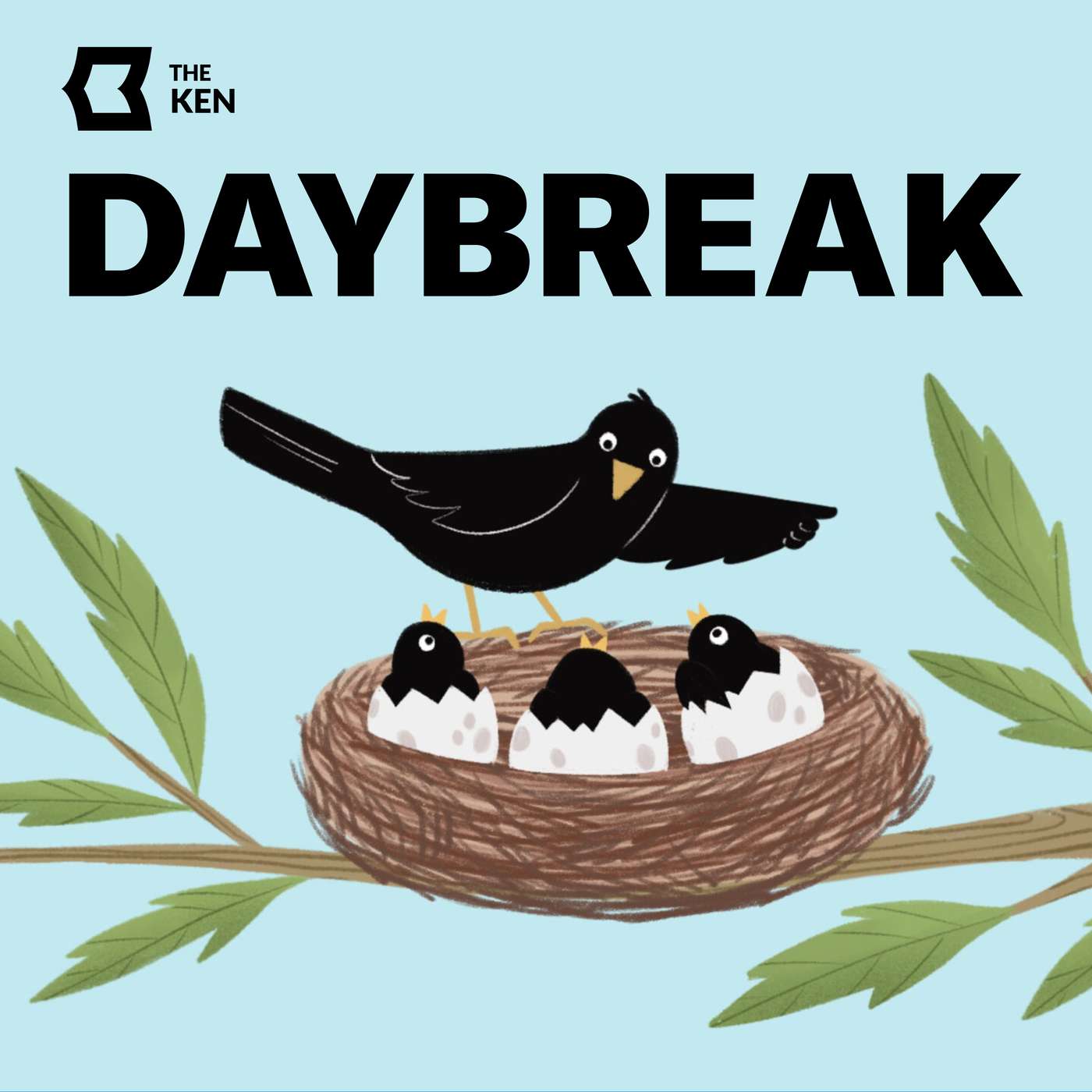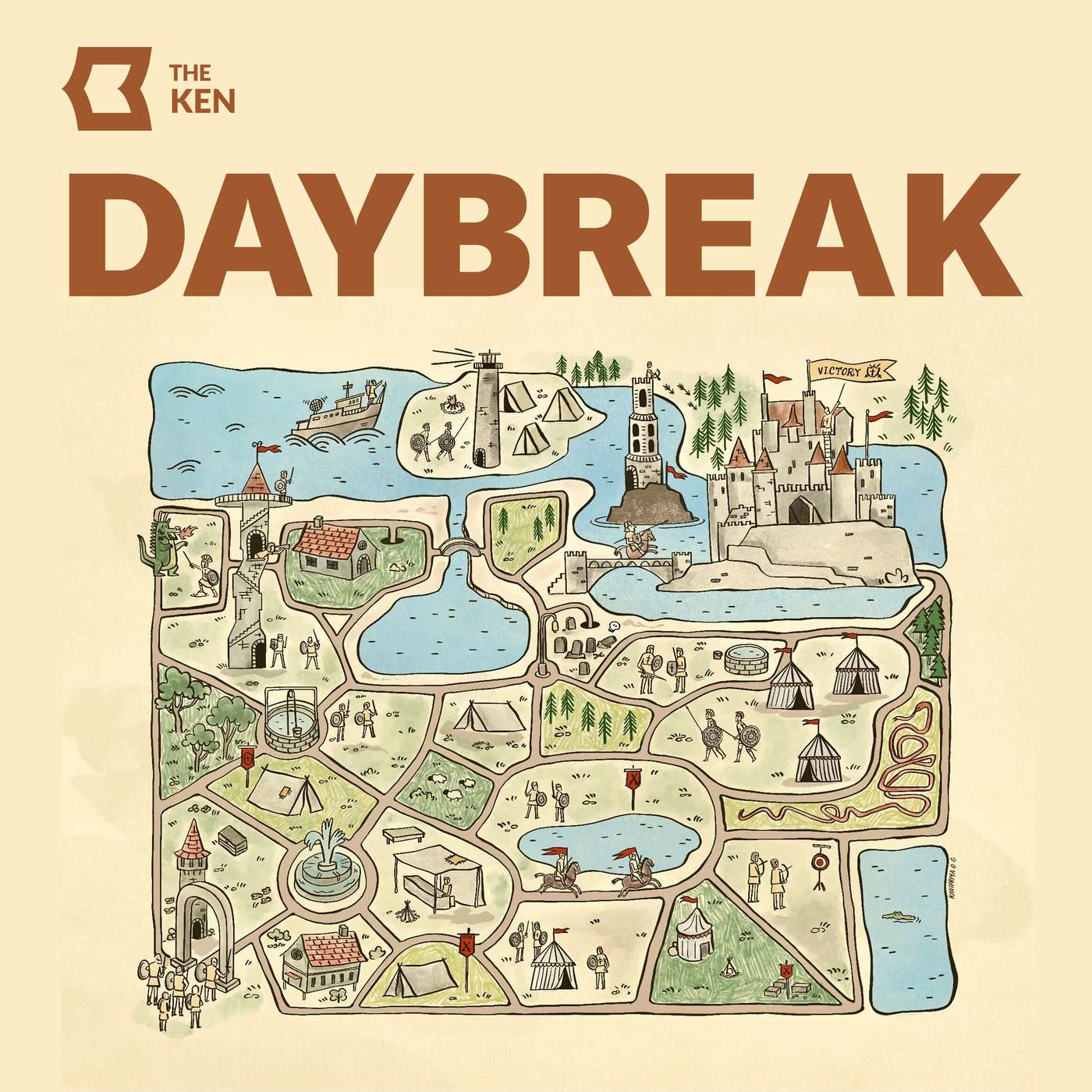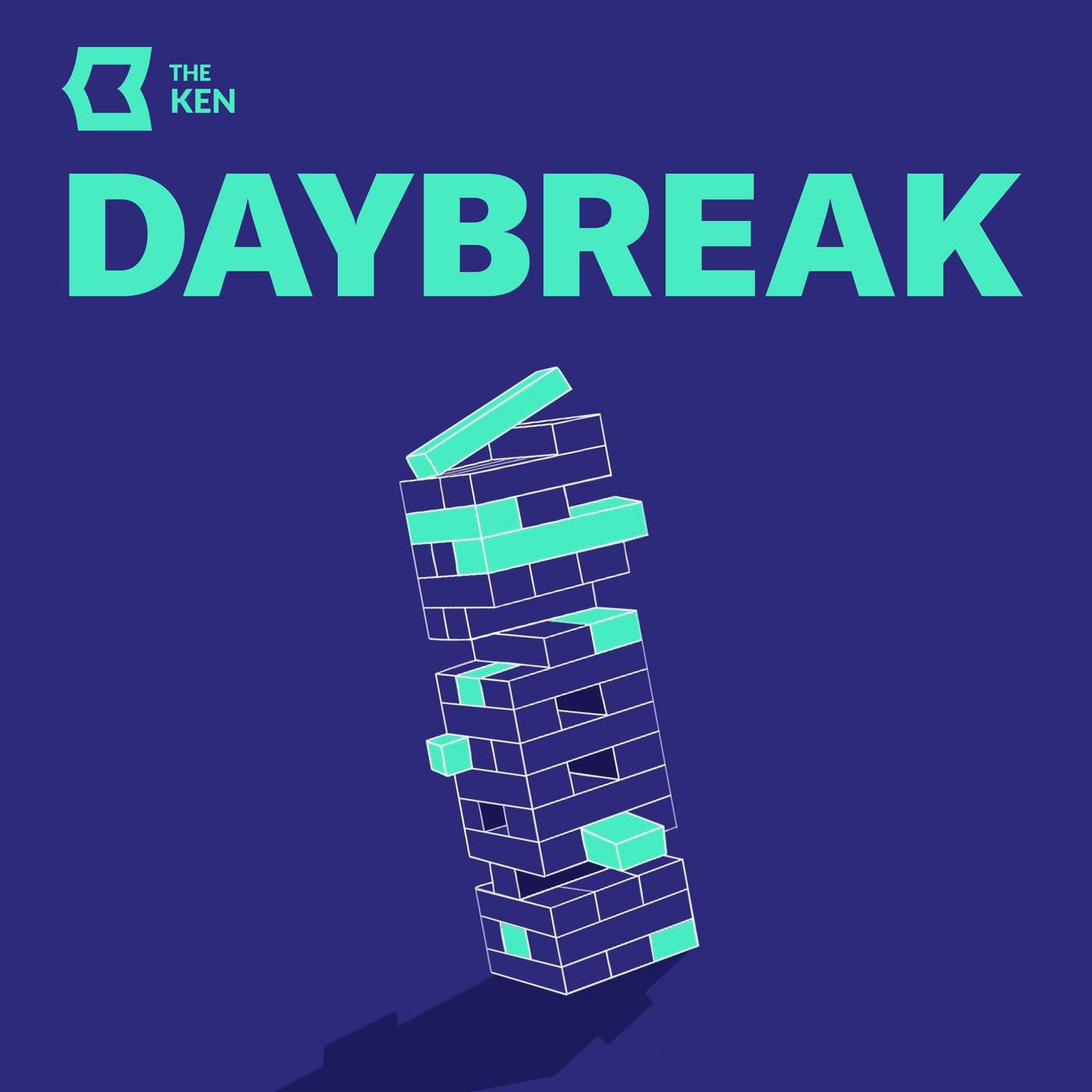Discover Daybreak
Daybreak

Daybreak
Author: The Ken
Subscribed: 20,387Played: 185,280Subscribe
Share
© (c) 2023 The Ken
Description
Business news is complex and overwhelming. It doesn’t have to be. Every day of the week, from Monday to Friday, Daybreak tells one business story that’s significant, simple and powerful.
Hosted from The Ken’s newsroom by Snigdha Sharma and Rachel Varghese, Daybreak relies on years of original reporting and analysis by some of India’s most experienced and talented business journalists.
Hosted from The Ken’s newsroom by Snigdha Sharma and Rachel Varghese, Daybreak relies on years of original reporting and analysis by some of India’s most experienced and talented business journalists.
649 Episodes
Reverse
Property prices across Indian cities have gone through the roof, up by nearly 30% in the last two years. This along with ever increasing rent and general cost of living has made planning for the future quite challenging for those in their 20s and 30s. So has the idea of home ownership changed among the younger generations, like in many Western countries where more and more people are choosing to rent rather than buy? Or are we still attached to the idea of owning a home?And what’s behind these record-breaking property prices anyway?Tune in to find out.Daybreak is produced from the newsroom of The Ken, India’s first subscriber-only business news platform. Subscribe for more exclusive, deeply-reported, and analytical business stories.
This episode is a look back at four Daybreak, The Ken stories that stayed with us in 2025.After three years of making the show, a few episodes each year stand out because they captured something shifting beneath the surface. These four did exactly that.Host and producer Snigdha Sharma revisits a conversation feat. Waterfield Advisor's Soumya Rajan about why even India’s wealthiest women still fight for financial control, how China’s rare earth dominance exposed the fragility of India’s EV push, the global silver crunch that linked AI, clean energy, and everyday prices, and India's AI future.Tune in.
Private equity is reshaping India’s schools. A relaxed New Education Policy and rising demand for international curricula have opened the doors for global operators to buy up chains across the country.The promise is scale, better infrastructure, and tighter governance. But the reality looks a little different—lean budgets, shrinking salary hikes, and a growing focus on cost-cutting. And the fallout? Increasing staff attrition, decreasing academic quality, and schools trading their founder-led ethos for a standardised model.Tune in.*Disclosure: The writer comes from a family that previously owned a school acquired partially by International Schools Partnership (ISP)**This episode was originally published on September 16th 2025Daybreak is produced from the newsroom of The Ken, India’s first subscriber-only business news platform. Subscribe for more exclusive, deeply-reported, and analytical business stories.
AI is changing how people learn languages and India is where the shift is showing up first. Duolingo has scale here but very little conversion. At the same time AI tools now offer practice, feedback, and even conversation for free, while Indian platforms focus on jobs, exams, and real outcomes. In this episode, we look at how language learning is being reshaped in India, why translation is no longer the whole story, and what Duolingo is really defending. Tune in.
From the very public Ambani family feud to the private struggles of the Raymond family, the transfer of wealth and power has often been messy.With over 850,000 millionaires in India, and many of them looking to transition their wealth in the next decade, there's a growing, yet largely unaddressed market for a specific type of expert: the succession coach.Part mediator, part therapist, part strategist—they do more than just advise. They keep dynasties from tearing themselves apart.Tune in.*This episode was originally published on September 1st 2025.Daybreak is produced from the newsroom of The Ken, India’s first subscriber-only business news platform. Subscribe for more exclusive, deeply-reported, and analytical business stories.
In this episode, we bring you two reported stories from The Ken's newsroom that stayed with us this year. The first, reported by Nuha Bubere, looks at Flipkart at a moment of pressure and at how its CEO Kalyan Krishnamurthy is running the company as competition intensifies and expectations remain high. In the second, Atul Krishna tells us about India’s decision to allow foreign universities to set up campuses in the country, and what that shift says about the state of higher education and public capacity. You can find more of our best work from 2025 at the-ken.com.
Buried deep in Amazon's app is a partnership with Orange Health Labs for at-home diagnostics—it's third healthcare experiment in India after pharmacy and telemedicine. The strategy? Target existing customers with zero advertising spend, keeping the bet low-risk while competitors like Bigbasket and Blinkit capture other categories. With its U.S. healthcare playbook built on insurance infrastructure that doesn't exist in India, Amazon is playing a cautious waiting game. The question: is this genuine ambition or just a way to keep a foot in the door?Daybreak is produced from the newsroom of The Ken, India’s first subscriber-only business news platform. Subscribe for more exclusive, deeply-reported, and analytical business stories.
Traditional case competitions are boring theater—companies toss out fake problems, students present cookie-cutter solutions nobody uses. The Ken flipped the script. It revealed something interesting: no company is safe anymore. Students attacked more than a 100 incumbents—from McKinsey to temple economies—and built working prototypes showing exactly how they'd do it. The insight? AI hasn't just lowered the cost of building to near-zero; it's fundamentally changed who can be a disruptor. Even established companies know this. Some volunteered as targets, desperate to understand how the next generation thinks. When anyone can build anything, disruption isn't a question of if—it's already happening.Check out the solutions here: https://the-ken.com/case-competition-2025/submissions/Daybreak is produced from the newsroom of The Ken, India’s first subscriber-only business news platform. Subscribe for more exclusive, deeply-reported, and analytical business stories.
The consumer-robotics graveyard is littered with well-funded American startups. Moxie, Jibo, Anki—all raised millions, then collapsed under cloud costs and thin margins. Enter Miko, a Mumbai company selling AI companions to American kids. With Indian manufacturing cutting costs to one-fifth of US production and subscriptions driving recurring revenue, Miko has advantages its rivals never had. Yet it's still losing money—120 crore rupees last year. Now, as the company hits 500,000 units in annual sales, it's reaching the exact scale where others stumbled. Can Miko's India edge break the robotics curse, or will it become just another cautionary tale?Tune in.Daybreak is produced from the newsroom of The Ken, India’s first subscriber-only business news platform. Subscribe for more exclusive, deeply-reported, and analytical business stories.
Uttar Pradesh now makes more than half the smartphones produced in India. Big electronics companies have set up factories in and around Noida. A place once known for small industries is suddenly part of a global supply chain.In this episode, we look at how that happened. What changed after the pandemic. Why policy, infrastructure and geography mattered. And why almost all this growth is packed into a small belt near Delhi.Tune in.Daybreak is produced from the newsroom of The Ken, India’s first subscriber-only business news platform. Subscribe for more exclusive, deeply-reported, and analytical business stories.
India has the engineers, the users, and the ambition to be an AI superpower. But as OpenAI floods the market at ₹399/month, Google invests $15 billion, and global giants harvest Indian data, a critical question emerges: Will India settle for being the world's largest AI user, or can it become a builder that matters?From DeepSeek's $6M shock to the race for AI sovereignty, we connect the dots on India's AI moment—and what could be next.Tune in. Episodes mentioned: Deepseek: Spotify | Apple | Youtube ChatGPT 399 Plan: Spotify | Apple | YoutubeIndia's Sovereign AI: Spotify | Apple | YoutubeDeloitte's AI blunder: Spotify | Apple | YoutubeAI Browsers: Spotify | Apple | YoutubeWhy AI minds are refusing big bucks: Spotify | Apple | YoutubeCall Centres are being rewritten by AI: Spotify | Apple | YoutubeWrite to us with your thoughts at podcast@the-ken.com! Daybreak is produced from the newsroom of The Ken, India’s first subscriber-only business news platform. Subscribe for more exclusive, deeply-reported, and analytical business stories.
The Indian government is losing patience with consumer-tech platforms using dark patterns or manipulative design tricks.In late May 2024, Consumer Affairs Minister, Pralhad Joshi, gathered the country’s biggest internet companies, Amazon, Google, Zomato, Ola Electric, etc to give them an ultimatum: clean up your user interfaces by September 5 or face the consequences.From hidden fees on Amazon to guilt-inducing pop-ups on Indigo, these tactics push users into spending more money, sharing more data, or giving up more control, often without realising it. And they’re deeply baked into how these companies grow, making them hard to remove without hurting the bottom line.Tune in.**This episode was first published on 11 August, 2025Daybreak is produced from the newsroom of The Ken, India’s first subscriber-only business news platform. Subscribe for more exclusive, deeply-reported, and analytical business stories.
Youtube launched Shopping in India in October 2024, and within a year, 40% of eligible creators adopted it. The platform is betting on high-intent audiences who research before buying—unlike Instagram's impulse-driven model. By building shopping infrastructure in-house and partnering with Flipkart and Myntra, Youtube offers creators high commissions.The shift is democratizing income for micro-creators, while affiliate GMV exploded from Rs 10 crore to Rs 300 crore in two years. Youtube isn't trying to beat Instagram at its game—it's doubling down on what it does best.Tune in.Daybreak is produced from the newsroom of The Ken, India’s first subscriber-only business news platform. Subscribe for more exclusive, deeply-reported, and analytical business stories.
In this episode we fill you in on three standout stories from the past week. First, a deeper look at this year's latest Wealth Inequality Report; Next, what the Netflix-Paramount fight for Warner Brothers means for Indian players; And finally, why and how Indigo has started to behave.Tune in.Daybreak is produced from the newsroom of The Ken, India’s first subscriber-only business news platform. Subscribe for more exclusive, deeply-reported, and analytical business stories.
Lenskart is now a public company, and its first real market test just arrived. The shares fell a little over 3% on December 8 as the shareholder lock-in expired, putting the company back in the news and making it a good moment to revisit how it got here. Lenskart ended FY25 with a ₹297 crore in profit and nearly 40 % of that now comes from its 656 stores outside India. That global reach is unusual for an Indian consumer brand, especially when others like Zomato and Ola struggled overseas.The company’s steady expansion strategy has leaned on selective acquisitions, investments and joint ventures. And its real strength is a vertically integrated supply chain that keeps prices tight, speeds up product launches and maintains consistency across markets. With the stock settling into life post-listing, today, we look back at what built Lenskart’s momentum.**This episode was first published on Aug 25, 2025Daybreak is produced from the newsroom of The Ken, India’s first subscriber-only business news platform. Subscribe for more exclusive, deeply-reported, and analytical business stories.
India's Atal Incubation Centres promised to be the backbone of government innovation. With 500 crore rupees in initial funding and support from Niti Aayog, these 72 centres were supposed to nurture startups with grants, mentors, and infrastructure.Nearly a decade later, the results are sobering. Of 3,500 incubated startups, fewer than 5% have raised external capital. Most centres lack basic websites or outcome metrics. No external audits. No unicorns.Now the government wants to double down—allocating 2,750 crore rupees to expand the ecosystem. But nobody seems to care if the existing network actually works.Tune in.
Yesterday, the Economic Times reported that JioStar has told the ICC it wants to exit its India media rights deal for cricket events, even with two years still left in the cycle. The company also doubled its provisions for expected losses suggesting the rights may cost more to deliver than they can earn back. It all started in late 2024 when Jio came in and flipped the script by streaming cricket tournaments for free and leaning towards a more ad-heavy model. For viewers, it felt like progress. But now with the drop in ad spending from online money gaming platforms after new regulations, Jio is feeling the squeeze.Tune in.Daybreak is produced from the newsroom of The Ken, India’s first subscriber-only business news platform. Subscribe for more exclusive, deeply-reported, and analytical business stories.
Manoj Kumar Tiwari had a tough job: transform the Tata Institute of Social Sciences into something that looks more like a management school. In his two year term? Mission accomplished.TISS now uses the same entrance exam as IIMs. It's hiring faculty from business schools instead of NGOs. Management courses are in, social science programs are struggling to fill seats. Over 100 staff were laid off in 2024.This isn't just about TISS. It's part of a larger pattern where institutions like JNU and IRMA are sacrificing arts and humanities for what the "market" wants. The government's 2020 education policy is pushing universities toward self-sufficiency—which means more management, and less social work.Tune in.Daybreak is produced from the newsroom of The Ken, India’s first subscriber-only business news platform. Subscribe for more exclusive, deeply-reported, and analytical business stories.
IndiGo had one of its worst weeks ever with hundreds of flights cancelled across major airports. New pilot rest rules kicked in on November 1, 2025 and the airline’s tight schedules and lean crew planning could not absorb the change. Thousands of passengers were stranded. What really happened and why did India’s biggest airline struggled so suddenly? In this episode, we look at what this means for the country’s fast growing aviation system. Because when one rule change can bring the busiest carrier to a halt the bigger question is how close to the edge we are flying?Tune in.Listen to the latest episode of Two by Two on The bro-ification of business and tech podcasts here. Daybreak is produced from the newsroom of The Ken, India’s first subscriber-only business news platform. Subscribe for more exclusive, deeply-reported, and analytical business stories.
Physicswallah grew with almost no funding kept most of its ownership and built a huge following around its founder Alakh Pandey. Then it shifted gears and started buying companies expanding offline and spending more to grow faster. The numbers changed the risks changed and the company itself changed. Investors still showed up for the IPO but the real question is what comes next.What happens when a company built on frugality and founder energy suddenly tries to scale like a giant?Take this survey to share your best AI project.Daybreak is produced from the newsroom of The Ken, India’s first subscriber-only business news platform. Subscribe for more exclusive, deeply-reported, and analytical business stories.













lol the roadshitters are talking about AI
Ruined my morning. Got a person who has no connect with the ground reality in India and wants to copy ideas from the US and force down our throats. absolute disgrace!
Very important investment regulatory issue highlighted.